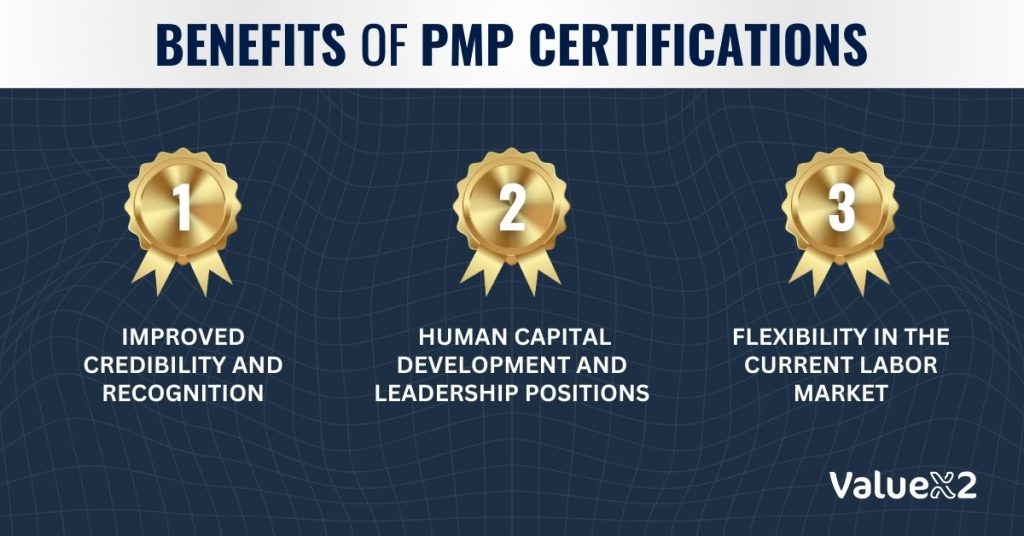Be ready for 2025 with the world-acclaimed PMP® certification. Upgrade your knowledge, increase your wages and gain access to career choices in leading sectors globally.

Introduction
The Project Management Professional Certification Course is the ultimate industry standard for those seeking a career in project management. With industries around the globe undergoing constant transformations, there is a need for professionals who can manage challenging projects correctly. PMP® training ensures that professionals understand how to manage projects to perfection.
As we step into 2025 the significance of this certification can be more competitive in a rapidly evolving job market. Good PMP training and proper planning on how to obtain PMP® certification, allows candidates to secure new higher positions and better-paid jobs.
Not only does passing all the requirements for the PMP® certification increase credibility but also receiving this certification paves the way to better-paid jobs and raises–with an average of 17% more salary for those with PMP® certification. All the advantages of the PMP® certification course suggest that it is worth thinking about how to advance your career and earn more money.
Understanding PMP® Certification and Training
What is PMP® Certification and Training?
PMP® certification shows that one is proficient in project management both nationally and internationally. It is a certification demonstrating an individual’s efficiency in managing projects universally with success in different sectors. Gaining the PMP® certification demonstrates your proficiency in planning, managing, controlling and executing projects to deliver value from the projects.
PMP® certification course prepares you to handle the challenges in project management besides providing a ticket to better-paid jobs across the globe. Certified project management professionals offer many people higher salaries, so it is very valuable for a career.
CHECK OUT PMI CERTIFICATION COURSES OFFERED BY VALUEX2
The PMP® Certification Eligibility Requirements in 2025
Before sitting for the exam, candidates have to meet PMP® certification requirements to apply for the PMP certification. Such requirements are meant to protect potential students from poor practice of the profession.
Educational Requirements
Bachelor’s Degree: Candidates must have a minimum of three years of professional project management experience.
High School Diploma or Equivalent: 60 months of professional project management experience is required.
Professional Experience
Candidates must have practical experience as project leaders. They need to evaluate experience in all stages of project development and implementation: initiating, planning, executing, monitoring and closing.
PMP® Certification Training and Preparation
PMP training should be accomplished; passing out necessitates 35 contact hours of project management education. PMP certification online classes are carried out at the participants’ convenience time with the tutor’s help.
These courses offer organized training to candidates on the PMP® certification examination syllabus. Enabling the candidates to relate the knowledge to real-life situations.
PMP® Certification Exam Structure in 2025
The PMP® certification exam is challenging, which is the real nature of the profession of a project manager. The PMP certification exam format consists of:
180 Questions: There are four types of assessment – Multiple-choice, Multiple-response, Matching, and Objective.
Time Limit: 230 minutes.
Domains Covered: Business people (42%), the process (50%), and business environment (8%).
Career Opportunities with PMP® Certification in 2025
The Profesional Management Professional Certification is not just a certification, but the entry to a great number of work fields, sectors and countries. Since business entities around the globe still focus on measures of successful project management, there is a constant need for the certification of such specialists.
The course that prepares candidates for the PMP® certification expands their competencies in planning and leadership and general problem-solving skills hence making the candidates valuable resources in their respective organizations. This certification guarantees career progression and a remunerational boost.
Top Industries for PMP Professionals
- IT and Technology
Employment opportunities for PMP-certified persons are also found in the tech industries. Board-certified project managers oversee software development, information technology and systems implementation projects. However, due to the continued digitization, the need for professionals with PMP training to help manage challenging technical projects is on the rise.
- Construction and Infrastructure
Starting from residential buildings to mega infrastructural projects the construction industry depends heavily on project management. PMP-certified professionals plan, schedule and coordinate huge projects to meet their respective temporal, financial and resource requirements.
- Healthcare
It has been noted that with development in health care and the way it is being practised and policies put in place, the management of projects in the health care sector is becoming even more challenging. Project managers holding the PMP® certification work actively in scaling up the hospitals, implementing new technologies, and research projects.
- Finance and Consulting
Employers use the PMP® certification requirements to identify potential leaders who should be able to handle changes in regulation, technology, and products. Consulting firms also appreciate personnel attaining project management professional certification to succeed in delivering excellent solutions to their clients.
Emerging Roles for PMP® Certified Professionals
With the changes in the project management professions and the advent of various agile project management tools, new positions are being generated for accredited persons.
- Agile Project Manager
As agile methodologies go mainstream, those earning the PMP certification are seeking work as the hybrid agile project manager, utilizing the best of both worlds.
- Digital Transformation Leader
Today’s enterprises looking for digital transformation recruit PMP-certified professionals to manage functionally diverse projects including AI, cloud, and big data.
- Sustainable Project Manager
Today sustainability has become a strategic management issue in business. The project management professional with PMP certification pays attention to an earth-friendly project management strategy suitable for compliance with legislation on environmental conservation.
Salary Potential for PMP® Certified Professionals in 2025
Gaining the Project Management Professional (PMP®) certification is one of the most effective actions that any project manager can undertake in their career. Apart from the validation of your skills, it further opens up the opportunity to earn larger profits.
A certified project management professional earns more than non-certified colleagues, this is attributed to the recognition and competencies garnered by a certificate. PMP professionals continue to be in the league of the most paid project managers globally and across industries in 2025.
Global Salary Trends
Comparison of the Average Salary by Region
- North America: The corresponding counterparts in the United States and Canada are paid the highest rates in the world and vary in the amount between $120,000 and $135,000 per annum.
- Europe: Some of the countries such as Germany, Switzerland, and the United Kingdom pay close to $95,000 to as much as $115,000 to PMP holders.
- Asia-Pacific: Employment in emerging countries including India, China and Australia, offer moderate wages that range between Thirty- Thousand, US dollars and Seventy- Thousand, US dollars depending on the employment experience and sectors of the country.
- Middle East: Currently the rates of pay in UAE and Saudi Arabia for instance range from $80000 to $100000 for project professionals indicating a growing demand for project managers.
Variables affecting PMP® Certified Professionals’ wages
- Industry: Industry areas like IT, finance, healthcare, construction, etc. usually pay the highest salary to their employees holding PMP certification.
- Location: Employment remuneration of PMP differs with region, and developed nations provide the highest pay for the employees.
- Experience: Similar to other career positions, the salaries of senior project managers together with those who have more years of experience and PMP certifications are higher than those of those with little experience.
PMP® Certified Salaries vs. Non-Certified Project Managers
Basic Differences in Earning Capacity
PMP-certified professionals receive 20 to 25 per cent higher salaries than other project managers who are not PMP-certified. This premium is justified by the assumed additional level of competency and expertise that PMPcertificants possess.
There are cognitive skills which employers have realized they derive from training for PMP and the preparation for PMP certification which include structured problem-solving and leadership ability which in turn leads to better pay packages and careers.
Why Those With PMP® Certification Earn More
- Credibility: Since the holders of the project management professional certification indicate commitment and proficiency, organizations have a preference for the PMP.
- Skillset: The PMP certification indicates that the person has enhanced skills in carrying out the following key tasks in a project, people with PMP certification demonstrate high skills in the following;
- Global Recognition: Global employers understand the value of PMP, which has translated to some consistency in better pay.
Top Industries with Highest Earning PMP® Certification
- Information Technology (IT): The IT sector pays its PMP-certified project manager higher wages for handling IT software and structural projects.
- Finance and Banking: PMP certification is respected in financial institutions because the professional holding this cert cannot only handle compliance projects but also overcome any regulatory hurdle.
- Healthcare: Exploding healthcare technology and infrastructure has heightened the need for PMP-certified managers within this category.
- Construction and Infrastructure: Big construction projects within large cities and transport systems need professional project managers who meet the PMP certification.
Benefits of PMP® Certification

The PMP® certification is much greater than simply the financial gain it brings to the certification holder. It is one of the most sought-after certifications because it raises your profile, enhances your value and makes you future-proof in the current world of work.
Improved Credibility and recognition
Gaining the PMP qualification means the candidate knows the main concepts and approaches to project management. Employees and employers alike seek out and acknowledge PMP-certified members as those who know how to deliver successful projects every time.
The standardized conditions of PMP increase the knowledge level of people who pass this examination, which creates high levels of confidence and credibility.
By being in possession of the PMP certification, one gets membership to some closed groups, forums, and other professional working bodies whose main intent is to offer chances to network, sponsor and consult. By itself, the PMP network is not merely a support but a tool for career growth and the exchange of information.
Human capital development and leadership positions
The PMP® certification course focuses on comprehensive skill development, covering areas such as:
Risk Management: Managing change, risks and issues in a project within the design of an organisation.
Stakeholder Communication: Mainly, the necessity of effectively conveying information from one colleague to another as well as with other stakeholders in the organization.
Strategic Planning: Strategies for project selection and management for better organizational outcomes.
When aspiring project managers complete PMP training or are in the process of preparing for PMP certification, they acquire technical and interpersonal skills, which cannot be waived in any organization.
Flexibility in the Current Labor Market
It has become apparent that the common employment opportunities in the modern world are changing at the rate of the new technologies and methodologies that are rapidly transforming the way projects are managed. PMP holders are well-versed in:
Agile Methodologies: Extending agile methodologies to the systems of the conventional project management methodology.
Digital Transformation: Needed to be at the forefront of projects that deal with AI, big data and cloud.
Sustainability Practices: Eco-friendly and social security involving projects’ management.
Preparing for PMP® Certification in 2025
Obtaining the PMP® credential is a major career accomplishment for any project manager and opens up increased opportunities. But it involves some good preparations and a lot of dedication. The PMP examination therefore requires adequate preparation right from the selection of the right PMP training to developing right techniques in handling time.
Tips for PMP® Certification Exam Preparation
Picking the Best Training for Employees
Choosing the right PMP certification course is the primary step towards preparation for how to pass the exam. Look for programs that:
- Are accredited by PMI (Project Management Institute).
- Policy and accommodate the students with other such as online and or blended learning programs.
- Package that also contains summaries, sample tests and quizzes.
- Offer instructors with good background knowledge of their students which may include past experiences.
High-quality PMP training investments also guarantee you comprehend what is on the exam, and the skills learned that are not assessed in the exam.
Study Strategies and Time Management Tips
- Create a Study Plan: Try to break the PMP syllabus down into smaller parts, which will help not to overload you. When studying set a specific date on which each topic or section will be covered.
- Focus on the PMBOK Guide: A primary source for the exam is the PMI’s Project Management Body of Knowledge (PMBOK).
- Practice Regularly: Take practice tests to check your readiness and examine the problematic subjects.
- Join Study Groups: Group study with other candidates will assist in the clarification of matters and also keep one focused.
- Allocate Dedicated Time: Ideally, you should set your study schedule to a regime where you study every day in preparation for tests, quizzes and assignments without neglecting other important aspects of your daily life.
Tools and Resources
Top Books for the Preparation of PMP®
- PMBOK Guide (latest edition): The essential source for relatively simple but important definitions.
- Rita Mulcahy’s PMP Exam Prep: Appreciated by users who pay attention to the clarity of the explanations and the focus on realistic examples.
Mock Exams and Simulators
- PrepCast Exam Simulator: Includes practice exams that provide valuable insights into your performance.
- PM Training Practice Tests: Includes all major types of questions likely to be posed to you during the examination.
- Mock Tests on PMI’s Website: Sample questions that are official and test your preparedness levels.
Conclusion
In 2025, the PMP® certification continues to be relevant for professionals wishing to perform best in project management. Its features make it to be very standard all over the world making it to be one of the best certifications in the current market. In addition to substantiating your authority in the industry, the certification establishes you for diverse career prospects across leading sectors and also raises the salary bar exponentially.
So, if you’re willing to take your job to the next level, there is no better time to do it than now. Purchasing a PMP certification course, obtaining the necessary PMP certification, and commencing your path to becoming a professional are all possible.
Frequently Asked Questions (FAQs)
Q. Can I take the PMP exam without experience?
Ans. No, one cannot sit for this PMP examination if he or she does not have the right experience. The PMP requires that you have a bachelor’s degree or the equivalent combination of academic education and GP experience – 36 months of which must be project management experience for PMP certificate holders with a bachelor’s degree while those with a secondary education need 60 months of project management experience.
Q. How much experience do you need for PMP certification?
Ans. Candidates require 36 months of project management experience with a bachelor’s degree or high school diploma to qualify for the PMP examination or 60 months with the high school diploma. It makes you well-prepared for a practical approach needed in PMP certification preparation, as well as leadership positions.
Q. Do I need to be a project manager to get a PMP certification?
Ans. It is not necessary to hold the position of Project Manager, but one’s work experience should squarely fit into the PMP certification requirements. Examples of activities include team leadership, budgeting and supervision of projects. PMP training will add to your qualifications when you are through with it.
Q. Do I need to be a PMI member to secure a PMP certification?
Ans. You do not need to be a PMI member to become PMP-certified, but it comes with its benefits which include:
- A lower PMP exam fee,
- Access to many products and
- Tools that equip you with information on the PMP certification exam.
Specifically, individuals who are not PMP members can also complete the certification requirements plus sit for the exam.
Q. How much time does the PMP application process take?
Ans. It takes 5-10 business days for a PMP application after its submission. Make sure that all the details fit the PMP certification requirements to ensure easy passing through of the approval processes. You can set your exam when you get the approval to prepare for a chosen focus of the PMP certification.






